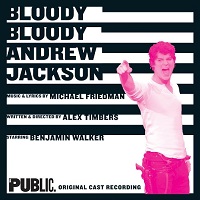 Original Cast, 2010 (Ghostlight)
Original Cast, 2010 (Ghostlight)  (1.5 / 5) Before Hamilton took the world by storm in 2016 with a musical style previously underrepresented on Broadway and a story featuring American historical figures, composer-lyricist Michael Friedman and book writer Alex Timbers utilized similar elements to create Bloody Bloody Andrew Jackson in 2010. The cast album was released following the musical’s successful engagement at the Public Theater and before its disappointing run of 120 performances on Broadway. If the show is certainly no Hamilton, its punk rock score still offers some genuine moments to savor. Take the opening number, “Populism Yea Yea.” Only the most hardened critics could resist banging their heads along to the catchy lyrics. And give a listen to the recording’s final track, “The Hunters of Kentucky,” for another prime example of Friedman’s ability to excite the listener. You won’t have long to wait between those two highlights; the recording is a slight 28 minutes long, making it one of the shortest cast albums ever. Bloody Bloody Andrew Jackson attempts to satirize its title character, played by Benjamin Walker, by portraying him as a foulmouthed, angsty, emo rock star. The idea is to lampoon Jackson’s most controversial decisions and actions by attributing them to his immature, reactive personality, a device that may not register when one is listening to the songs out of context. The score also makes the mistake of glamorizing Jackson’s emotionality as the show goes on, depriving the satire of its bite. Additionally, it should be noted that the original production was widely criticized by Native American activist groups, and subsequent productions have been protested, due to the material’s perceived insensitivity in its depiction of historical events. Comparisons to Hamilton only go so far, given Bloody Bloody Andrew Jackson‘s lack of nuance and the disparity in quality between the two scores. — Forrest Hutchinson
(1.5 / 5) Before Hamilton took the world by storm in 2016 with a musical style previously underrepresented on Broadway and a story featuring American historical figures, composer-lyricist Michael Friedman and book writer Alex Timbers utilized similar elements to create Bloody Bloody Andrew Jackson in 2010. The cast album was released following the musical’s successful engagement at the Public Theater and before its disappointing run of 120 performances on Broadway. If the show is certainly no Hamilton, its punk rock score still offers some genuine moments to savor. Take the opening number, “Populism Yea Yea.” Only the most hardened critics could resist banging their heads along to the catchy lyrics. And give a listen to the recording’s final track, “The Hunters of Kentucky,” for another prime example of Friedman’s ability to excite the listener. You won’t have long to wait between those two highlights; the recording is a slight 28 minutes long, making it one of the shortest cast albums ever. Bloody Bloody Andrew Jackson attempts to satirize its title character, played by Benjamin Walker, by portraying him as a foulmouthed, angsty, emo rock star. The idea is to lampoon Jackson’s most controversial decisions and actions by attributing them to his immature, reactive personality, a device that may not register when one is listening to the songs out of context. The score also makes the mistake of glamorizing Jackson’s emotionality as the show goes on, depriving the satire of its bite. Additionally, it should be noted that the original production was widely criticized by Native American activist groups, and subsequent productions have been protested, due to the material’s perceived insensitivity in its depiction of historical events. Comparisons to Hamilton only go so far, given Bloody Bloody Andrew Jackson‘s lack of nuance and the disparity in quality between the two scores. — Forrest Hutchinson
Category Archives: Reviews by Show Name
First Daughter Suite
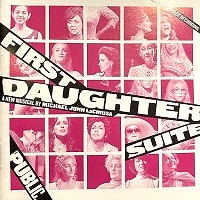 Original Off-Broadway Cast, 2016 (Ghostlight, 2CDs)
Original Off-Broadway Cast, 2016 (Ghostlight, 2CDs)  (4 / 5) One of the great joys of studying and reviewing musical theater cast recordings is tracking the growth and maturity of an artist. Composer-lyricist Michael John LaChuisa has been writing scores for the theater since the 1990s, and his work has continued to develop and expand both musically and dramatically. His score for First Daughter Suite is a high-water mark in both regards. Whereas LaChiusa’s earlier works contained snatches of truncated melodies, this score is full of well-crafted, extended musical sequences. A sort of sequel to of his previous musical First Lady Suite, this one portrays the daughters and wives of American Presidents from both political parties in four separate vignettes. The Nixons, Fords, Carters, Reagans, and Bushes are all present, played by a luminous, uniformly excellent, all-female cast. Barbara Walsh portrays Pat Nixon, Alison Fraser doubles as Betty Ford and Nancy Reagan, and Mary Testa plays Barbara Bush, with Rachel Bay Jones and Caissie Levy doing fine character work in multiple roles. Testa, one of the theater’s most unique treasures, is particularly moving here. LaChiusa wrote his most probing and thought-provoking lyrics for her while searching for any crack in the armor of “Granite Granny” Barbara Bush; in describing the feeling of loss she experienced when her young daughter died of leukemia, Mrs. Bush sings the lyric “losing every atom of myself I thought I had” to heartbreaking effect. First Daughter Suite has been captured in its near entirety on this two-disc recording, which even includes a 22-minute track primarily consisting of dialogue between Alison Fraser’s Nancy Reagan and her estranged daughter, Patti Davis (Levy). Each scene represents not only the personal lives of these people but also marks the progression of America’s views on women during the latter part of the 20th century. If one finds LaChiusa’s early works difficult to enjoy, this score is a perfect opportunity to revisit his music and see how his style has evolved. — Forrest Hutchinson
(4 / 5) One of the great joys of studying and reviewing musical theater cast recordings is tracking the growth and maturity of an artist. Composer-lyricist Michael John LaChuisa has been writing scores for the theater since the 1990s, and his work has continued to develop and expand both musically and dramatically. His score for First Daughter Suite is a high-water mark in both regards. Whereas LaChiusa’s earlier works contained snatches of truncated melodies, this score is full of well-crafted, extended musical sequences. A sort of sequel to of his previous musical First Lady Suite, this one portrays the daughters and wives of American Presidents from both political parties in four separate vignettes. The Nixons, Fords, Carters, Reagans, and Bushes are all present, played by a luminous, uniformly excellent, all-female cast. Barbara Walsh portrays Pat Nixon, Alison Fraser doubles as Betty Ford and Nancy Reagan, and Mary Testa plays Barbara Bush, with Rachel Bay Jones and Caissie Levy doing fine character work in multiple roles. Testa, one of the theater’s most unique treasures, is particularly moving here. LaChiusa wrote his most probing and thought-provoking lyrics for her while searching for any crack in the armor of “Granite Granny” Barbara Bush; in describing the feeling of loss she experienced when her young daughter died of leukemia, Mrs. Bush sings the lyric “losing every atom of myself I thought I had” to heartbreaking effect. First Daughter Suite has been captured in its near entirety on this two-disc recording, which even includes a 22-minute track primarily consisting of dialogue between Alison Fraser’s Nancy Reagan and her estranged daughter, Patti Davis (Levy). Each scene represents not only the personal lives of these people but also marks the progression of America’s views on women during the latter part of the 20th century. If one finds LaChiusa’s early works difficult to enjoy, this score is a perfect opportunity to revisit his music and see how his style has evolved. — Forrest Hutchinson
Bernarda Alba
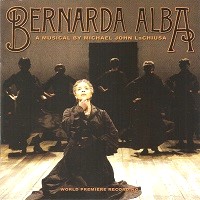 Off-Broadway Cast, 2006 (Ghostlight)
Off-Broadway Cast, 2006 (Ghostlight)  (2.5 / 5) This recording begins with a thrilling and percussive “Prologue” that lays out the haunting story of Bernarda Alba, the recently-widowed mother of five daughters. After her husband’s death, Bernarda refuses to allow any member of her household to leave their home or interact with anyone from the outside world for a set mourning period of eight years. Armed with this concept, the composer, Michael John LaChuisa has packed his score with strong Spanish flamenco beats and rhythms that pay tribute to the source material, Federico Garcia Loca’s drama The House of Bernarda Alba. A strong nod should also be given to Michael Starobin for his fantastic, rhythmic orchestrations throughout the album. But although this musical was certainly an artistic success on stage, it’s difficult to recommend the recording due to LaChiusa’s aversion to melody and song structure. While he has here gifted us with appealing songs such as “Love Let Me Sing You” and “The Smallest Stream,” the bulk of the album is filled with difficult, meandering melodies that hold the listener at arm’s length from what should be a compelling and harrowing story. In the recording’s favor, it does feature Phylicia Rashad as the titular mother. Rashad’s Bernarda is filled with bitterness that has turned to oppressive anger, and she wrings every drop of emotion from the aforementioned “The Smallest Stream.” The rest of the cast of this Lincoln Center Theater production is an abundance of riches, with Saundra Santiago, Judith Blazer, Sally Murphy, Daphne Rubin-Vega, and Nikki M. James as the five daughters. Each of their unique voices are recognizable throughout, but with such an incredible group of performers, it’s a shame they aren’t given more standout material. Overall, this album is not an easy listen; the dark subject matter and complex score make for an intellectually stimulating listening experience, but not always a pleasurable one. — Forrest Hutchinson
(2.5 / 5) This recording begins with a thrilling and percussive “Prologue” that lays out the haunting story of Bernarda Alba, the recently-widowed mother of five daughters. After her husband’s death, Bernarda refuses to allow any member of her household to leave their home or interact with anyone from the outside world for a set mourning period of eight years. Armed with this concept, the composer, Michael John LaChuisa has packed his score with strong Spanish flamenco beats and rhythms that pay tribute to the source material, Federico Garcia Loca’s drama The House of Bernarda Alba. A strong nod should also be given to Michael Starobin for his fantastic, rhythmic orchestrations throughout the album. But although this musical was certainly an artistic success on stage, it’s difficult to recommend the recording due to LaChiusa’s aversion to melody and song structure. While he has here gifted us with appealing songs such as “Love Let Me Sing You” and “The Smallest Stream,” the bulk of the album is filled with difficult, meandering melodies that hold the listener at arm’s length from what should be a compelling and harrowing story. In the recording’s favor, it does feature Phylicia Rashad as the titular mother. Rashad’s Bernarda is filled with bitterness that has turned to oppressive anger, and she wrings every drop of emotion from the aforementioned “The Smallest Stream.” The rest of the cast of this Lincoln Center Theater production is an abundance of riches, with Saundra Santiago, Judith Blazer, Sally Murphy, Daphne Rubin-Vega, and Nikki M. James as the five daughters. Each of their unique voices are recognizable throughout, but with such an incredible group of performers, it’s a shame they aren’t given more standout material. Overall, this album is not an easy listen; the dark subject matter and complex score make for an intellectually stimulating listening experience, but not always a pleasurable one. — Forrest Hutchinson
Big Fish
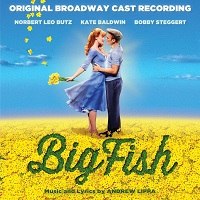 Original Broadway Cast, 2014 (Broadway Records)
Original Broadway Cast, 2014 (Broadway Records)  (3 / 5) Big Fish arrived on Broadway in 2013 with a score by Andrew Lippa and was imaginatively directed by Susan Stroman, but it did not last more than 100 performances. Fortunately, this recording has preserved much of the show’s charm. A strong cast includes Tony Award winner Norbert Leo Butz as Edward Bloom, a yarn-spinning, traveling salesman who dazzles his son, Will (a pleasant-sounding Bobby Steggart), with stories of adventure that stretch the imagination. These oftentimes unbelievable tales strain Edward’s relationship with his son and frustrate his long-suffering wife, played by Kate Baldwin. Butz sounds fantastic throughout; he’s youthful and charming in the opening number, “Be the Hero,” and inspiring in his solo, “Fight the Dragons.” Baldwin’s endearing soprano is much appreciated in softer moments such as the lovely “ I Don’t Need A Roof.” The score culminates with the highly emotional song “How It Ends,” a reconciliation for father and son. Unfortunately, between the effective songs for the main characters, there are several production numbers featuring other characters that do not come across nearly as well on the recording and may serve to make this album a slightly frustrating, but certainly not a profitless, listening experience. — Forrest Hutchinson
(3 / 5) Big Fish arrived on Broadway in 2013 with a score by Andrew Lippa and was imaginatively directed by Susan Stroman, but it did not last more than 100 performances. Fortunately, this recording has preserved much of the show’s charm. A strong cast includes Tony Award winner Norbert Leo Butz as Edward Bloom, a yarn-spinning, traveling salesman who dazzles his son, Will (a pleasant-sounding Bobby Steggart), with stories of adventure that stretch the imagination. These oftentimes unbelievable tales strain Edward’s relationship with his son and frustrate his long-suffering wife, played by Kate Baldwin. Butz sounds fantastic throughout; he’s youthful and charming in the opening number, “Be the Hero,” and inspiring in his solo, “Fight the Dragons.” Baldwin’s endearing soprano is much appreciated in softer moments such as the lovely “ I Don’t Need A Roof.” The score culminates with the highly emotional song “How It Ends,” a reconciliation for father and son. Unfortunately, between the effective songs for the main characters, there are several production numbers featuring other characters that do not come across nearly as well on the recording and may serve to make this album a slightly frustrating, but certainly not a profitless, listening experience. — Forrest Hutchinson
The Gardens of Anuncia
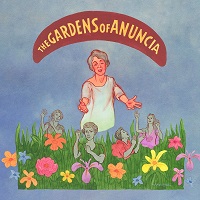 Original Off-Broadway Cast, 2024 (Ghostlight)
Original Off-Broadway Cast, 2024 (Ghostlight)  (4.5 / 5) From the shimmery first notes of The Gardens of Anuncia, listeners will get the feeling they’re entering a magical land. What follows is a gem of a show that tells the story of the upbringing of the great Broadway choreographer Graciela Daniele. (The character here closely based on Daniele is known as Anuncia.) The roles of the three women who raised Daniele, known as “Mami,” “Grandmama,” and “Tia,” are brought to vivid life by Michael John LaChiusa’s extravagant melodies and precise lyrics, and the performers of these roles provide the listener with great gifts: the soaring vocals of Eden Espinosa (Mami), the undeniable charm of Andrea Burns (Tia), and the singular combination of brashness and heart possessed by Mary Testa as Grandmama. (Who else could bring you to the verge of tears with the lyrics “Eat your macaroni!/I don’t want you to be hungry?”) The title role is played dually by Priscilla Lopez, who provides the proper serenity and charm in narrating the show as the older Anuncia, and Kalyn West, who does an admirable job as the innocent, young version of the character, being taught the ways of the world by her three female mentors. The show risks feeling saccharine towards the beginning, as most of the early songs are simply depictions of the happy lives of the four women. But the music is never uninteresting — listeners should not be surprised if they find themselves humming the opening refrain about “Mami, Grandmama, Tia, and me.” The show takes a sharp left turn once Anuncia’s mother is taken as a political prisoner; in “The Vigil,” LaChiusa’s haunting music does justice to the confusion and anxiety every member of the family must have felt during that difficult time. And in “The Story of That Man,” Anuncia stops serving as a secondary character to the women who raised her, coming to the forefront as she shares the traumatic and limited memories she has of her father. Lovely diversions from these more serious moments are provided by two singing deer, both played by Tally Sessions, who appear in the older Anuncia’s garden to impart an important life lesson: “Dance while you can.” Sessions brings a vaudevillian touch to the proceedings, and these numbers brilliantly fit with the rest of the score despite their surface silliness. This show never feels like a vanity project, but Daniele’s ultimate mission in creating it is clear throughout: To give the three strong women who raised her their due. That goal is accomplished with special beauty in the finale, “Never a Goodbye,” in which older Anuncia finally buries the ashes of her aunt. Considering this recording’s many delights, no listener will be sorry that they let LaChiusa and Daniele lead them down this garden path. — Charles Kirsch
(4.5 / 5) From the shimmery first notes of The Gardens of Anuncia, listeners will get the feeling they’re entering a magical land. What follows is a gem of a show that tells the story of the upbringing of the great Broadway choreographer Graciela Daniele. (The character here closely based on Daniele is known as Anuncia.) The roles of the three women who raised Daniele, known as “Mami,” “Grandmama,” and “Tia,” are brought to vivid life by Michael John LaChiusa’s extravagant melodies and precise lyrics, and the performers of these roles provide the listener with great gifts: the soaring vocals of Eden Espinosa (Mami), the undeniable charm of Andrea Burns (Tia), and the singular combination of brashness and heart possessed by Mary Testa as Grandmama. (Who else could bring you to the verge of tears with the lyrics “Eat your macaroni!/I don’t want you to be hungry?”) The title role is played dually by Priscilla Lopez, who provides the proper serenity and charm in narrating the show as the older Anuncia, and Kalyn West, who does an admirable job as the innocent, young version of the character, being taught the ways of the world by her three female mentors. The show risks feeling saccharine towards the beginning, as most of the early songs are simply depictions of the happy lives of the four women. But the music is never uninteresting — listeners should not be surprised if they find themselves humming the opening refrain about “Mami, Grandmama, Tia, and me.” The show takes a sharp left turn once Anuncia’s mother is taken as a political prisoner; in “The Vigil,” LaChiusa’s haunting music does justice to the confusion and anxiety every member of the family must have felt during that difficult time. And in “The Story of That Man,” Anuncia stops serving as a secondary character to the women who raised her, coming to the forefront as she shares the traumatic and limited memories she has of her father. Lovely diversions from these more serious moments are provided by two singing deer, both played by Tally Sessions, who appear in the older Anuncia’s garden to impart an important life lesson: “Dance while you can.” Sessions brings a vaudevillian touch to the proceedings, and these numbers brilliantly fit with the rest of the score despite their surface silliness. This show never feels like a vanity project, but Daniele’s ultimate mission in creating it is clear throughout: To give the three strong women who raised her their due. That goal is accomplished with special beauty in the finale, “Never a Goodbye,” in which older Anuncia finally buries the ashes of her aunt. Considering this recording’s many delights, no listener will be sorry that they let LaChiusa and Daniele lead them down this garden path. — Charles Kirsch
I Can’t Keep Running in Place
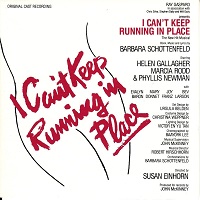 Original Off-Broadway Cast, 1981 (Painted Smiles)
Original Off-Broadway Cast, 1981 (Painted Smiles)  (1 / 5) This musical about a six-week women’s assertiveness training workshop came across as little more than an audition piece for Barbara Schottenfeld, who wrote the book, music, and lyrics. The songs are decent enough, sincere and spirited, even if the music disappears from your mind the moment after you’ve heard it. But the book just isn’t there, and the characters are minimally delineated: the rich and acerbic one, the fat one, the smug student, the doormat, and so on. They occasionally take part in telephone conversations about husbands and children, but mostly they sing one song after another. As performed by Helen Gallagher, Joy Franz, Evalyn Baron, Phyllis Newman, and especially Marcia Rodd in the role of the troubled therapists, the musical numbers are momentarily effective but, without plot or characters to back them up, they’re out there on their own — David Wolf
(1 / 5) This musical about a six-week women’s assertiveness training workshop came across as little more than an audition piece for Barbara Schottenfeld, who wrote the book, music, and lyrics. The songs are decent enough, sincere and spirited, even if the music disappears from your mind the moment after you’ve heard it. But the book just isn’t there, and the characters are minimally delineated: the rich and acerbic one, the fat one, the smug student, the doormat, and so on. They occasionally take part in telephone conversations about husbands and children, but mostly they sing one song after another. As performed by Helen Gallagher, Joy Franz, Evalyn Baron, Phyllis Newman, and especially Marcia Rodd in the role of the troubled therapists, the musical numbers are momentarily effective but, without plot or characters to back them up, they’re out there on their own — David Wolf
Half-Past Wednesday/Rumpelstiltskin
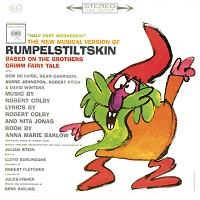 Original Off-Broadway Cast, 1962 (Columbia/no CD) No stars, not recommended. The success of Once Upon a Mattress inspired several other fairy tale musicals, including this one — but the authors of Mattress knew how to adapt their source material for the stage so that it would appeal to adults. In contrast, the writers of Half-Past Wednesday — Robert Colby, Nita Jones, and Anna Marie Barlow — took the story of Rumpelstiltskin and changed almost nothing. This is the original tale: straight, unadorned, and very involving if you’re six years old. The songs aren’t even run-of-the-mill in quality, there’s not a fresh idea to be found here, and despite the fact that the score contains a number of supposedly comic songs, there are no jokes. Columbia tried to repackage and retitle this LP to sell it as a children’s album, but it’s not even clever enough for kids, and they’ll hate the soppy love songs. The most notable member of the cast is Dom DeLuise, most of whose mannerisms were in place by the time of this recording. — David Wolf
Original Off-Broadway Cast, 1962 (Columbia/no CD) No stars, not recommended. The success of Once Upon a Mattress inspired several other fairy tale musicals, including this one — but the authors of Mattress knew how to adapt their source material for the stage so that it would appeal to adults. In contrast, the writers of Half-Past Wednesday — Robert Colby, Nita Jones, and Anna Marie Barlow — took the story of Rumpelstiltskin and changed almost nothing. This is the original tale: straight, unadorned, and very involving if you’re six years old. The songs aren’t even run-of-the-mill in quality, there’s not a fresh idea to be found here, and despite the fact that the score contains a number of supposedly comic songs, there are no jokes. Columbia tried to repackage and retitle this LP to sell it as a children’s album, but it’s not even clever enough for kids, and they’ll hate the soppy love songs. The most notable member of the cast is Dom DeLuise, most of whose mannerisms were in place by the time of this recording. — David Wolf
Fermat’s Last Tango
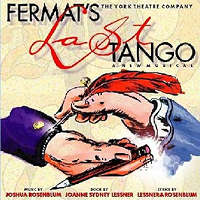 Original Off-Broadway Cast, 2002 (Original Cast Records)
Original Off-Broadway Cast, 2002 (Original Cast Records)  (3 / 5) A musical about a math problem? It’s a crazy notion, but composer-lyricist Joshua Rosenblum and librettist-lyricist Joanne Sydney Lessner make it work. Their show was inspired by the controversial last theorem of French mathematician Pierre de Fermat, which has the mythical qualities needed to support a dramatic framework. Fermat’s Last Tango is a bizarre, surprisingly effective, mostly true musical detective story. The creators changes few of the real-life facts beyond renaming the central figure Daniel Keane. Femat himself appears, taunting and yet assisting Keane throughout the show; if the device seems a bit silly at first, it works because of the epic scope of the musical. (Euclid, Newton, Pythagoras, and other mathematicians also appear.) The score is often operatic in weight, and the talented cast is more than up to the challenge. Chris Thompson displays a booming baritone as Keane, Jonathan Rabb’s pompous Fermat is lots of fun, and the members of the ensemble (Christianne Tisdale, Carrie Wilshusen, Gilles Chiasson, and Mitchell Kantor) are excellent. Perhaps the best performance on the cast album comes from Edwardyne Cowan, who plays Keane’s wife. With her beautiful voice, Cowan puts over the show’s one concession to traditional musical comedy, a terrific number titled “Math Widow.” But there are several other enjoyable songs here. Although Fermat’s Last Tango is not recommended as light background music, it’s definitely worth a listen or two. — Matthew Murray
(3 / 5) A musical about a math problem? It’s a crazy notion, but composer-lyricist Joshua Rosenblum and librettist-lyricist Joanne Sydney Lessner make it work. Their show was inspired by the controversial last theorem of French mathematician Pierre de Fermat, which has the mythical qualities needed to support a dramatic framework. Fermat’s Last Tango is a bizarre, surprisingly effective, mostly true musical detective story. The creators changes few of the real-life facts beyond renaming the central figure Daniel Keane. Femat himself appears, taunting and yet assisting Keane throughout the show; if the device seems a bit silly at first, it works because of the epic scope of the musical. (Euclid, Newton, Pythagoras, and other mathematicians also appear.) The score is often operatic in weight, and the talented cast is more than up to the challenge. Chris Thompson displays a booming baritone as Keane, Jonathan Rabb’s pompous Fermat is lots of fun, and the members of the ensemble (Christianne Tisdale, Carrie Wilshusen, Gilles Chiasson, and Mitchell Kantor) are excellent. Perhaps the best performance on the cast album comes from Edwardyne Cowan, who plays Keane’s wife. With her beautiful voice, Cowan puts over the show’s one concession to traditional musical comedy, a terrific number titled “Math Widow.” But there are several other enjoyable songs here. Although Fermat’s Last Tango is not recommended as light background music, it’s definitely worth a listen or two. — Matthew Murray
Cowgirls
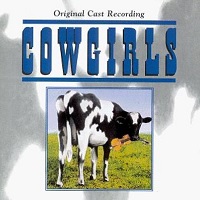 Original Off-Broadway Cast, 1996 (Varèse Sarabande)
Original Off-Broadway Cast, 1996 (Varèse Sarabande)  (2 / 5) This cute little show, with music and lyrics by Mary Murfitt and a book by Betsy Howie, had a decent run Off-Broadway in 1996. The song titles alone — “From Chopin to Country,” “Love’s Sorrow,” “Don’t Call Me Trailer Trash,” “Saddle Tramp Blues,” “They’re All Cowgirls to Me” — give you an idea of what sort of entertainment you’re in for if you give the cast album a listen. The material is very slight but lots of fun, and the charming cast consists of co-author Murfitt and Howie plus Rhonda Coullet, Mary Ehrlinger, Lori Fischer, and Jackie Sanders. They all give their all, and the recording is a pleasant diversion — Michael Portantiere
(2 / 5) This cute little show, with music and lyrics by Mary Murfitt and a book by Betsy Howie, had a decent run Off-Broadway in 1996. The song titles alone — “From Chopin to Country,” “Love’s Sorrow,” “Don’t Call Me Trailer Trash,” “Saddle Tramp Blues,” “They’re All Cowgirls to Me” — give you an idea of what sort of entertainment you’re in for if you give the cast album a listen. The material is very slight but lots of fun, and the charming cast consists of co-author Murfitt and Howie plus Rhonda Coullet, Mary Ehrlinger, Lori Fischer, and Jackie Sanders. They all give their all, and the recording is a pleasant diversion — Michael Portantiere
Greenwich Village U.S.A.
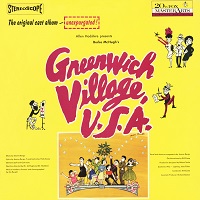 Original Off-Broadway Cast, 1960 (20th Century Fox/no CD) No stars, not recommended. Some people have a blind affection for 1950s and ’60s revues, but being blind doesn’t mean that you have to be deaf, too. There isn’t anything in Greenwich Village U.S.A. that’s worth five seconds of your time. Although the section of New York City that’s the subject of this review was admittedly more distinctive in the ’50s that it has been in later years, it was never exactly Borneo, yet the authors of this show consistently depict its residents as some rare breed of exotics. That basic lack of honesty is one main reason why nothing here is funny. Another reason is the sheer lack of talent displayed in the writing. Those responsible for this fiasco were Jeanne Bargy, composer-lyricist; Frank Gehrecke, book writer-lyricist; and Herb Corey, lyricist. The only item of (minor) interest in this recording is that one of the performers, ballad singer Dawn Hampton, was an early influence on Bette Midler — David Wolf
Original Off-Broadway Cast, 1960 (20th Century Fox/no CD) No stars, not recommended. Some people have a blind affection for 1950s and ’60s revues, but being blind doesn’t mean that you have to be deaf, too. There isn’t anything in Greenwich Village U.S.A. that’s worth five seconds of your time. Although the section of New York City that’s the subject of this review was admittedly more distinctive in the ’50s that it has been in later years, it was never exactly Borneo, yet the authors of this show consistently depict its residents as some rare breed of exotics. That basic lack of honesty is one main reason why nothing here is funny. Another reason is the sheer lack of talent displayed in the writing. Those responsible for this fiasco were Jeanne Bargy, composer-lyricist; Frank Gehrecke, book writer-lyricist; and Herb Corey, lyricist. The only item of (minor) interest in this recording is that one of the performers, ballad singer Dawn Hampton, was an early influence on Bette Midler — David Wolf
A Christmas Story
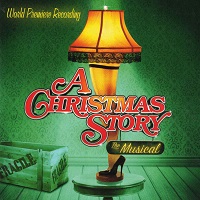 World Premiere Recording, 2012 (Masterworks Broadway)
World Premiere Recording, 2012 (Masterworks Broadway)  (4 / 5) In this stage adaptation of the film of the same title about a boy who really wants a BB gun for Christmas, songwriters Benj Pasek and Justin Paul demonstrate their craft through songs too good-natured and sturdily built to be faulted for their basically pastiche elements. There are jazzy tap numbers, western-inspired romps, and lots of jingling holiday fare with golden-age melodic coutours. The pair clearly had a blast assembling this score, even if the film’s episodic structure doesn’t always lend itself to effective musical storytelling; sequences like “Ralphie to the Rescue” and the endless “A Major Award” suggest that some of the dance arrangements and extended numbers could have been trimmed for the recording. But the otherwise warmly jocular score froths into something more soaring in three tracks that show off Pasek and Paul’s gifts for inventing joyous melody and showcasing kids’ voices: “Counting Down to Christmas,” “Somewhere Hovering Over Indiana,” and the gentle title song are all gems that make a strong case for this album as a keeper. Its warmth and shimmer are largely due to the gorgeous orchestrations of Larry Blank, perhaps some of the best of the 2010s in their brassy clarity and Christmasy sumptuousness. The cast of this “World Premiere Recording” largely represents the 2011 pre-Broadway touring company, with the exceptions of Liz Callaway as Ralphie’s mother and Tom Wopat as the grownup Narrator. (These performers never played these roles on stage.) Callaway is a redemptive presence, her tender, honest tone always keeping the ballads on the safe side of saccharine. And Clarke Hallum makes a meal out of Ralphie’s substantial amount of material, which allow for some astonishingly non-grating pre-teen belting. — Dan Rubins
(4 / 5) In this stage adaptation of the film of the same title about a boy who really wants a BB gun for Christmas, songwriters Benj Pasek and Justin Paul demonstrate their craft through songs too good-natured and sturdily built to be faulted for their basically pastiche elements. There are jazzy tap numbers, western-inspired romps, and lots of jingling holiday fare with golden-age melodic coutours. The pair clearly had a blast assembling this score, even if the film’s episodic structure doesn’t always lend itself to effective musical storytelling; sequences like “Ralphie to the Rescue” and the endless “A Major Award” suggest that some of the dance arrangements and extended numbers could have been trimmed for the recording. But the otherwise warmly jocular score froths into something more soaring in three tracks that show off Pasek and Paul’s gifts for inventing joyous melody and showcasing kids’ voices: “Counting Down to Christmas,” “Somewhere Hovering Over Indiana,” and the gentle title song are all gems that make a strong case for this album as a keeper. Its warmth and shimmer are largely due to the gorgeous orchestrations of Larry Blank, perhaps some of the best of the 2010s in their brassy clarity and Christmasy sumptuousness. The cast of this “World Premiere Recording” largely represents the 2011 pre-Broadway touring company, with the exceptions of Liz Callaway as Ralphie’s mother and Tom Wopat as the grownup Narrator. (These performers never played these roles on stage.) Callaway is a redemptive presence, her tender, honest tone always keeping the ballads on the safe side of saccharine. And Clarke Hallum makes a meal out of Ralphie’s substantial amount of material, which allow for some astonishingly non-grating pre-teen belting. — Dan Rubins
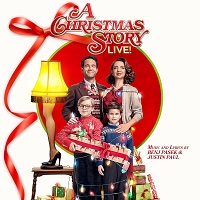 Television Cast, 2017 (Warner Bros.)
Television Cast, 2017 (Warner Bros.)  (4 / 5) The cast album of the live TV production of A Christmas Story sounds splendid, even when compared to the sparkly original recording. Presumably, Larry Blank’s magnificent orchestrations benefit here from larger instrumentation than they received previously. As a result, songs that grew a bit wearisome on the first recording — such as “When You’re A Wimp” and “Sticky Situation” — here have enough big-band pizzazz to hold focus. In the role of the dismissive teacher (“You’ll Shoot Your Eye Out!”), Jane Krakowski is luxury casting. So too is Maya Rudolph; though she’s not a seasoned musical theater performer, she taps into her pre-Saturday Night Live singing background, bringing a wearied edge to “What A Mother Does” and a simple warmth to “Just Like That.” Matthew Broderick’s wistful voice is a good fit for the Narrator. And as young Ralphie, Andy Walken follows formidably in the shoes of Clarke Hallum. With just a tad less musical-theater brightness in his vibrato, Walken has equal emotional heft as his predecessor in the role. For the most part, the track list here matches that of the world premiere recording, with the additions of a forgettable credits song, “Count on Christmas” (performed by pop star Bebe Rexha) and a rather amusing Hanukkah number, “In the Market for A Miracle” (delivered with chutzpah by another SNL alumna with Broadway bona fides, Ana Gasteyer). — D.R.
(4 / 5) The cast album of the live TV production of A Christmas Story sounds splendid, even when compared to the sparkly original recording. Presumably, Larry Blank’s magnificent orchestrations benefit here from larger instrumentation than they received previously. As a result, songs that grew a bit wearisome on the first recording — such as “When You’re A Wimp” and “Sticky Situation” — here have enough big-band pizzazz to hold focus. In the role of the dismissive teacher (“You’ll Shoot Your Eye Out!”), Jane Krakowski is luxury casting. So too is Maya Rudolph; though she’s not a seasoned musical theater performer, she taps into her pre-Saturday Night Live singing background, bringing a wearied edge to “What A Mother Does” and a simple warmth to “Just Like That.” Matthew Broderick’s wistful voice is a good fit for the Narrator. And as young Ralphie, Andy Walken follows formidably in the shoes of Clarke Hallum. With just a tad less musical-theater brightness in his vibrato, Walken has equal emotional heft as his predecessor in the role. For the most part, the track list here matches that of the world premiere recording, with the additions of a forgettable credits song, “Count on Christmas” (performed by pop star Bebe Rexha) and a rather amusing Hanukkah number, “In the Market for A Miracle” (delivered with chutzpah by another SNL alumna with Broadway bona fides, Ana Gasteyer). — D.R.
Days of Wine and Roses
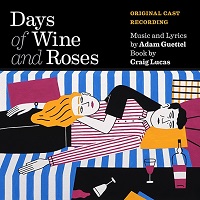 Original Cast, 2023 (Nonesuch)
Original Cast, 2023 (Nonesuch)  (5 / 5) Days of Wine and Roses marks the first musical with a score by composer/lyricist Adam Guettel that has been produced since Guettel’s triumph with The Light in the Piazza in 2005, and it was well worth the wait. Recorded in advance of the show’s Broadway premiere but after its initial production at the Atlantic Theater Company, this cast album is a beautiful gut punch. The music is different from any Broadway score of recent memory — full of earworms without being simple, and harmonically fascinating while remaining deliciously tonal. The orchestrations, which delight the ear, were also provided by Guettel. With a book by Craig Lucas, Days of Wine and Roses is based on the film of the same title. Brian d’Arcy James and Kelli O’Hara star as the show’s central couple, Kirsten Arnesen and Joe Clay, who meet on a boat (the album begins with the sound of rushing waves) and end up embarking on a devastating descent into alcoholism, each pulling the other further down. “Evanesce,” the song that the couple sings when they start drinking together, is a jazzy delight, complicated by ominous lyrics that predict their future (“Two dolphins breaking away / Two dolphins right to the grave/ Are we”). With the exception of the sweet-voiced Ella Dane Morgan as the couple’s young daughter, Lila, hardly any other performers are heard on the album; but James and O’Hara sing so well, and their voices blend so beautifully, that listeners won’t mind at all. O’Hara’s soprano has only become more colorful and expansive since she starred in Piazza, and “There Go I,” a beautiful ballad with evocative lyrics, serves as a showcase for her wondrous talent. “As The Water Loves The Stone” is one of the most heartfelt love songs this reviewer has ever heard, while the couple’s individual “mad scene” songs, “435” and “Morton Salt Girl,” would serve as playgrounds for any actor. The overall tone of the score is very sad, and many listeners may find themselves becoming emotional. It’s hard not to cry during “Turlycue,” the plaintive duet between a suffering mother and a confused daughter, and the joyfulness of “First Breath” becomes quite moving due to the direction of the plot. No musical theater maven should be without this recording; whether it haunts you, inspires you, or even triggers you, it’s certain to have a profound effect. — Charles Kirsch
(5 / 5) Days of Wine and Roses marks the first musical with a score by composer/lyricist Adam Guettel that has been produced since Guettel’s triumph with The Light in the Piazza in 2005, and it was well worth the wait. Recorded in advance of the show’s Broadway premiere but after its initial production at the Atlantic Theater Company, this cast album is a beautiful gut punch. The music is different from any Broadway score of recent memory — full of earworms without being simple, and harmonically fascinating while remaining deliciously tonal. The orchestrations, which delight the ear, were also provided by Guettel. With a book by Craig Lucas, Days of Wine and Roses is based on the film of the same title. Brian d’Arcy James and Kelli O’Hara star as the show’s central couple, Kirsten Arnesen and Joe Clay, who meet on a boat (the album begins with the sound of rushing waves) and end up embarking on a devastating descent into alcoholism, each pulling the other further down. “Evanesce,” the song that the couple sings when they start drinking together, is a jazzy delight, complicated by ominous lyrics that predict their future (“Two dolphins breaking away / Two dolphins right to the grave/ Are we”). With the exception of the sweet-voiced Ella Dane Morgan as the couple’s young daughter, Lila, hardly any other performers are heard on the album; but James and O’Hara sing so well, and their voices blend so beautifully, that listeners won’t mind at all. O’Hara’s soprano has only become more colorful and expansive since she starred in Piazza, and “There Go I,” a beautiful ballad with evocative lyrics, serves as a showcase for her wondrous talent. “As The Water Loves The Stone” is one of the most heartfelt love songs this reviewer has ever heard, while the couple’s individual “mad scene” songs, “435” and “Morton Salt Girl,” would serve as playgrounds for any actor. The overall tone of the score is very sad, and many listeners may find themselves becoming emotional. It’s hard not to cry during “Turlycue,” the plaintive duet between a suffering mother and a confused daughter, and the joyfulness of “First Breath” becomes quite moving due to the direction of the plot. No musical theater maven should be without this recording; whether it haunts you, inspires you, or even triggers you, it’s certain to have a profound effect. — Charles Kirsch
Evening Primrose
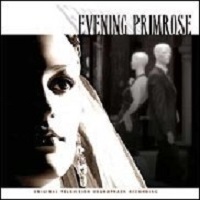 Television Cast, 1966 (Kritzerland)
Television Cast, 1966 (Kritzerland)  (3 / 5) Stephen Sondheim provided a brief but compelling score for this TV musical with a teleplay by James Goldman, based on a short story by John Collier. It tells the odd tale of a struggling poet named Charles, who decides to retreat from society by remaining in a Manhattan department store after closing time; he apparently intends to remain there alone indefinitely, retreating to the store’s nether regions during business hours, but soon he comes upon a small group of people who have decided to do the same thing. Charles falls in love with Ella, a young woman who has lived in the store since early childhood and barely remembers the outside world. In the telecast, Charles was played by Anthony Perkins, Ella by Charmian Carr. No cast album was released until 2008, when Krizerland transferred the soundtrack recordings of the songs to CD. Since it was never a stage musical and is unlikely ever to be one, Evening Primrose doesn’t warrant a lengthy review here, but it must be said that the four-song score contains two of the best ballads Sondheim ever wrote: Ella’s touching reminiscence “I Remember,” and the gorgeous duet “Take Me to the World.” Perkins, who had not very successfully tried his hand as a musical theater leading man in the 1960 Broadway show Greenwillow, is well cast and persuasive as Charles, while Carr, best known for her performance as Liesl in the mega-hit film version of The Sound of Music, is a plaintive Ella. The mid-’60s monaural sound quality of the recording is not great but acceptable. [Note: The full, 52-minute telecast is available separately on home video.] — Michael Portantiere
(3 / 5) Stephen Sondheim provided a brief but compelling score for this TV musical with a teleplay by James Goldman, based on a short story by John Collier. It tells the odd tale of a struggling poet named Charles, who decides to retreat from society by remaining in a Manhattan department store after closing time; he apparently intends to remain there alone indefinitely, retreating to the store’s nether regions during business hours, but soon he comes upon a small group of people who have decided to do the same thing. Charles falls in love with Ella, a young woman who has lived in the store since early childhood and barely remembers the outside world. In the telecast, Charles was played by Anthony Perkins, Ella by Charmian Carr. No cast album was released until 2008, when Krizerland transferred the soundtrack recordings of the songs to CD. Since it was never a stage musical and is unlikely ever to be one, Evening Primrose doesn’t warrant a lengthy review here, but it must be said that the four-song score contains two of the best ballads Sondheim ever wrote: Ella’s touching reminiscence “I Remember,” and the gorgeous duet “Take Me to the World.” Perkins, who had not very successfully tried his hand as a musical theater leading man in the 1960 Broadway show Greenwillow, is well cast and persuasive as Charles, while Carr, best known for her performance as Liesl in the mega-hit film version of The Sound of Music, is a plaintive Ella. The mid-’60s monaural sound quality of the recording is not great but acceptable. [Note: The full, 52-minute telecast is available separately on home video.] — Michael Portantiere
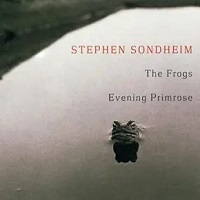 Studio Cast, 2001 (Nonesuch)
Studio Cast, 2001 (Nonesuch)  (4 / 5) The first part of this essential album contains the first commercial recordings of the songs that Sondheim wrote for The Frogs (see separate review, under that title). The second part is devoted to his even-briefer score for Evening Primrose, the 1966 TV musical that concerns the drop-out poet Charles’s encounter with, as Frank Rich phrases it in his notes for this recording, “a mysterious nocturnal society of eccentric shut-ins as well as the muse he’s been searching for, a sort of modern Rapunzel named Ella.” Here, Charles and Ella are sung by Neil Patrick Harris and Theresa McCarthy. Both do fine jobs of delivering the highlights of this mini-musical that are mentioned in the review above, as well as the score’s only other two numbers: Charles’s character-establishing “If You Can Find Me, I’m Here” and the extended duet “When?” All of the songs benefit greatly from Jonathan Tunick’s typically superb orchestrations as played by the American Theatre Orchestra under the baton of Sondheim specialist Paul Gemignani. The CD boasts Nonesuch’s usual, first-rate recorded sound: powerful but not harsh, ambient but not overly reverberant, with great dynamic range. — M.P.
(4 / 5) The first part of this essential album contains the first commercial recordings of the songs that Sondheim wrote for The Frogs (see separate review, under that title). The second part is devoted to his even-briefer score for Evening Primrose, the 1966 TV musical that concerns the drop-out poet Charles’s encounter with, as Frank Rich phrases it in his notes for this recording, “a mysterious nocturnal society of eccentric shut-ins as well as the muse he’s been searching for, a sort of modern Rapunzel named Ella.” Here, Charles and Ella are sung by Neil Patrick Harris and Theresa McCarthy. Both do fine jobs of delivering the highlights of this mini-musical that are mentioned in the review above, as well as the score’s only other two numbers: Charles’s character-establishing “If You Can Find Me, I’m Here” and the extended duet “When?” All of the songs benefit greatly from Jonathan Tunick’s typically superb orchestrations as played by the American Theatre Orchestra under the baton of Sondheim specialist Paul Gemignani. The CD boasts Nonesuch’s usual, first-rate recorded sound: powerful but not harsh, ambient but not overly reverberant, with great dynamic range. — M.P.
Back to the Future
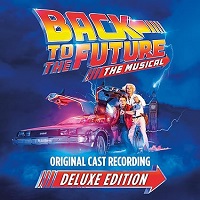 Original London Cast, 2022 (Masterworks Broadway) No stars; not recommended. These days, when you hear that a beloved movie is getting turned into a musical, it sounds less like an announcement and more like a threat. Yes, movies have inspired great musicals in the past., but the modern trend of these “adaptations” leans toward slavishly faithful recreations of the cinematic source material, with a couple of by-the-numbers songs pinned on. Enter Back to the Future: The Musical, which takes reverence to a new level. The script is by Bob Gale, who co-wrote the original movie’s screenplay and has spent decades overseeing the franchise; and the score is by Glen Ballard and Alan Silvestri, the latter of whom composed the music for the original movie and its sequels. Based on the classic 1985 original starring Michael J. Fox, the story tells of a kid living in the 1980s who accidentally goes back in time and meets his parents when they were teenagers. The stage musical version that yielded this recording first opened in the West End, then transferred to Broadway. (No cast album of that production has yet been recorded or released.) It’s a very lazy adaptation: From the beginning of the “Overture,” in which not a single note of any of the new music written for the show is heard, you can tell what the creative team’s intentions were. Instead, you get the movie’s recognizable theme in a heavily flourished arrangement, which ends up sounding like the product of a computer program. Ethan Popp and Bryan Cook’s orchestrations sound better in the actual songs, which unfortunately range in quality from instantly forgettable (“Got No Future” and “Future Boy”) to instantly regrettable (“My Myopia” and “Teach Him a Lesson”). Most of the lyrics sound like they were done on a first pass, while many of the melodies are vaguely reminiscent of better tunes. When the writers aren’t going for the most basic concepts in their songs, they decide to adhere even more faithfully to the movie by incorporating the exact same ’50s pop hits in the final sequence (“Earth Angel” and “Johnny B. Goode”) before tacking on the movie’s Oscar-nominated “The Power of Love” at the end. The cast is made up of talented singers, with Olly Dobson and Roger Bart starring as the iconic duo of Marty McFly and Doc Brown, respectively, but they’re mostly tasked with having to shoot for the ceiling of their vocal registers in every song. And when they’re not navigating the vocal demands, they’re forced into a competition of who can provide the most uncanny impression of their film counterparts; Hugh Coles as George McFly easily wins with an eerie imitation of Crispin Glover. If Gale, Silvestri and Ballard had been willing to take any creative chances, or alternatively had stepped aside for a team of writers who would have done so, this show might have been surprisingly delightful and/or enjoyably campy. But as it stands, there’s nothing about Back to the Future: The Musical that makes any strong argument for its existence. — Matt Koplik
Original London Cast, 2022 (Masterworks Broadway) No stars; not recommended. These days, when you hear that a beloved movie is getting turned into a musical, it sounds less like an announcement and more like a threat. Yes, movies have inspired great musicals in the past., but the modern trend of these “adaptations” leans toward slavishly faithful recreations of the cinematic source material, with a couple of by-the-numbers songs pinned on. Enter Back to the Future: The Musical, which takes reverence to a new level. The script is by Bob Gale, who co-wrote the original movie’s screenplay and has spent decades overseeing the franchise; and the score is by Glen Ballard and Alan Silvestri, the latter of whom composed the music for the original movie and its sequels. Based on the classic 1985 original starring Michael J. Fox, the story tells of a kid living in the 1980s who accidentally goes back in time and meets his parents when they were teenagers. The stage musical version that yielded this recording first opened in the West End, then transferred to Broadway. (No cast album of that production has yet been recorded or released.) It’s a very lazy adaptation: From the beginning of the “Overture,” in which not a single note of any of the new music written for the show is heard, you can tell what the creative team’s intentions were. Instead, you get the movie’s recognizable theme in a heavily flourished arrangement, which ends up sounding like the product of a computer program. Ethan Popp and Bryan Cook’s orchestrations sound better in the actual songs, which unfortunately range in quality from instantly forgettable (“Got No Future” and “Future Boy”) to instantly regrettable (“My Myopia” and “Teach Him a Lesson”). Most of the lyrics sound like they were done on a first pass, while many of the melodies are vaguely reminiscent of better tunes. When the writers aren’t going for the most basic concepts in their songs, they decide to adhere even more faithfully to the movie by incorporating the exact same ’50s pop hits in the final sequence (“Earth Angel” and “Johnny B. Goode”) before tacking on the movie’s Oscar-nominated “The Power of Love” at the end. The cast is made up of talented singers, with Olly Dobson and Roger Bart starring as the iconic duo of Marty McFly and Doc Brown, respectively, but they’re mostly tasked with having to shoot for the ceiling of their vocal registers in every song. And when they’re not navigating the vocal demands, they’re forced into a competition of who can provide the most uncanny impression of their film counterparts; Hugh Coles as George McFly easily wins with an eerie imitation of Crispin Glover. If Gale, Silvestri and Ballard had been willing to take any creative chances, or alternatively had stepped aside for a team of writers who would have done so, this show might have been surprisingly delightful and/or enjoyably campy. But as it stands, there’s nothing about Back to the Future: The Musical that makes any strong argument for its existence. — Matt KoplikHarmony
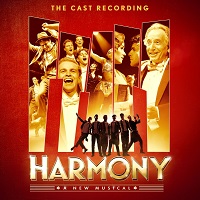 Original Broadway Cast, 2023 (Sh-K-Boom)
Original Broadway Cast, 2023 (Sh-K-Boom)  (4 / 5) It took Barry Manilow and Bruce Sussman’s musical Harmony 26 years to get to Broadway, over four times as long a period as the Comedian Harmonists themselves performed across the globe before being fractured by the Nazi regime. What we have here is not only a recounting of the sad but true story of that group but also a tribute to musical theater itself, with various songs reminiscent of the work of Gilbert & Sullivan, Sondheim, and Bock & Harnick (“The Wedding” has to be one of the most effective uses of traditional-sounding Jewish melodies since Fiddler on the Roof ). For that matter, the 11 o’clock number ends with a dramatic rendition of the “Sh’ma,” in what may be a knowing nod to Jason Robert Brown’s Parade. The young men who play the Comedian Harmonists, including Sean Bell and Danny Kornfeld as the two who seem most central to the plot, unquestionably produce skillful and satisfying harmonies, even if the timbre of their voices doesn’t quite suggest the era in which the show is set. Chip Zien, as an older version of one of the group, is tasked with narrating the show, and his gravitas helps to balance out some of the less powerful lyrics. Two of the cast recording’s strongest points are the expert vocal performances of Julie Benko and Sierra Boggess, whose duet “Where You Go” is haunting and memorable; one only wishes they had more to do on the album. The songs range from sarcastic comments on the Nazi regime (“Come to the Fatherland”) to imitations of flimsy 1930s numbers (“We’re Going Loco,” which hews closely to Manilow’s hit “Copacabana”), and are made more enjoyable by the rich, snazzy orchestrations of Doug Walter. While this score may not be unique enough to merit a place of high honor in the canon, many listeners will agree that the 26-year journey paid off. — Charles Kirsch
(4 / 5) It took Barry Manilow and Bruce Sussman’s musical Harmony 26 years to get to Broadway, over four times as long a period as the Comedian Harmonists themselves performed across the globe before being fractured by the Nazi regime. What we have here is not only a recounting of the sad but true story of that group but also a tribute to musical theater itself, with various songs reminiscent of the work of Gilbert & Sullivan, Sondheim, and Bock & Harnick (“The Wedding” has to be one of the most effective uses of traditional-sounding Jewish melodies since Fiddler on the Roof ). For that matter, the 11 o’clock number ends with a dramatic rendition of the “Sh’ma,” in what may be a knowing nod to Jason Robert Brown’s Parade. The young men who play the Comedian Harmonists, including Sean Bell and Danny Kornfeld as the two who seem most central to the plot, unquestionably produce skillful and satisfying harmonies, even if the timbre of their voices doesn’t quite suggest the era in which the show is set. Chip Zien, as an older version of one of the group, is tasked with narrating the show, and his gravitas helps to balance out some of the less powerful lyrics. Two of the cast recording’s strongest points are the expert vocal performances of Julie Benko and Sierra Boggess, whose duet “Where You Go” is haunting and memorable; one only wishes they had more to do on the album. The songs range from sarcastic comments on the Nazi regime (“Come to the Fatherland”) to imitations of flimsy 1930s numbers (“We’re Going Loco,” which hews closely to Manilow’s hit “Copacabana”), and are made more enjoyable by the rich, snazzy orchestrations of Doug Walter. While this score may not be unique enough to merit a place of high honor in the canon, many listeners will agree that the 26-year journey paid off. — Charles Kirsch
Big City Rhythm
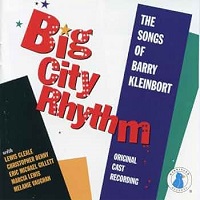 Original Off-Broadway Cast, 1996 (Original Cast Records)
Original Off-Broadway Cast, 1996 (Original Cast Records)  (3 / 5) The heyday of the intimate revue may have been decades ago, but some good ones have surfaced more recently. Consider Barry Kleinbort’s winning song cycle Big City Rhythm, blessed with a high-powered cast and Christopher Denny’s tasteful piano arrangements. As a composer-lyricist, Kleinbort has lots of range and is willing to serve up old-fashioned melody or new-fashioned lack thereof as suits the material. Some inside jokes may be lost on some listeners — for example, the salute to Broadway leading ladies who can’t sing — but those in the know will love them. Lots of stuff more accessible to the general public is here as well, including an extended medley of proposed theme songs for unlikely movies, one of the funniest of which is “Psycho, Are You Lonely Tonight?” Marcia Lewis is adorable as a peripatetic sophisticate in “I Get Around,” Lewis Cleale and Eric Michael Gillett are stalwart leading men, and Melanie Vaughan is exceedingly funny as a difficult chanteuse just out of the Betty Ford Clinic. Some of the strongest numbers are from Kleinbort’s proposed musical version of Garson Kanin’s The Rat Race; they’ll make you eager to hear more. — Marc Miller
(3 / 5) The heyday of the intimate revue may have been decades ago, but some good ones have surfaced more recently. Consider Barry Kleinbort’s winning song cycle Big City Rhythm, blessed with a high-powered cast and Christopher Denny’s tasteful piano arrangements. As a composer-lyricist, Kleinbort has lots of range and is willing to serve up old-fashioned melody or new-fashioned lack thereof as suits the material. Some inside jokes may be lost on some listeners — for example, the salute to Broadway leading ladies who can’t sing — but those in the know will love them. Lots of stuff more accessible to the general public is here as well, including an extended medley of proposed theme songs for unlikely movies, one of the funniest of which is “Psycho, Are You Lonely Tonight?” Marcia Lewis is adorable as a peripatetic sophisticate in “I Get Around,” Lewis Cleale and Eric Michael Gillett are stalwart leading men, and Melanie Vaughan is exceedingly funny as a difficult chanteuse just out of the Betty Ford Clinic. Some of the strongest numbers are from Kleinbort’s proposed musical version of Garson Kanin’s The Rat Race; they’ll make you eager to hear more. — Marc Miller
Bed & Sofa
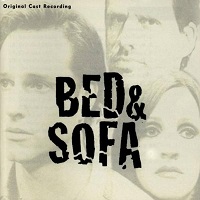 Original Off-Broadway Cast, 1996 (Varese Sarabande)
Original Off-Broadway Cast, 1996 (Varese Sarabande)  (4 / 5) A stylized, three-character “silent movie opera” by composer Polly Pen and playwright Lawrence Klavan, Bed & Sofa premiered just over a decade after Pen’s avant-garde Goblin Market. Like that show, it was presented Off-Broadway by the Vineyard Theatre, was directed by André Ernotte, and was showered with awards and nominations. Based on the 1927 Soviet film Tretya meshchanskaya by Abram Room and Victor Shklovsky, the piece centers on a married couple that invites the husband’s homeless army buddy to crash indefinitely on the sofa in their tiny flat. When the husband leaves town on business, his wife and friend embark on a passionate affair. Returning to find himself displaced in the bed, the husband winds up on the sofa. For a time, the resulting ménage à trois works pretty well, but then it’s beset by conflicts such as how to deal with the woman’s pregnancy and the mystery of which guy is the sire. Eventually, the woman discovers that her new man is as flawed as the old one, and she departs, leaving both sofa and bed to the men. Pen is often accused of lacking a flair for melody, but here she delivers a stunning score with dulcet arias that owe a debt to Mussorgsky, Prokofiev, and Russian folk tunes. With supervision by Ernotte and musical director Alan Johnson, Terri Klausner gives the wife earthiness and vigor, while Michael X. Martin as her spouse and Jason Workman as the interloper complete an ideally balanced ensemble. — Charles Wright
(4 / 5) A stylized, three-character “silent movie opera” by composer Polly Pen and playwright Lawrence Klavan, Bed & Sofa premiered just over a decade after Pen’s avant-garde Goblin Market. Like that show, it was presented Off-Broadway by the Vineyard Theatre, was directed by André Ernotte, and was showered with awards and nominations. Based on the 1927 Soviet film Tretya meshchanskaya by Abram Room and Victor Shklovsky, the piece centers on a married couple that invites the husband’s homeless army buddy to crash indefinitely on the sofa in their tiny flat. When the husband leaves town on business, his wife and friend embark on a passionate affair. Returning to find himself displaced in the bed, the husband winds up on the sofa. For a time, the resulting ménage à trois works pretty well, but then it’s beset by conflicts such as how to deal with the woman’s pregnancy and the mystery of which guy is the sire. Eventually, the woman discovers that her new man is as flawed as the old one, and she departs, leaving both sofa and bed to the men. Pen is often accused of lacking a flair for melody, but here she delivers a stunning score with dulcet arias that owe a debt to Mussorgsky, Prokofiev, and Russian folk tunes. With supervision by Ernotte and musical director Alan Johnson, Terri Klausner gives the wife earthiness and vigor, while Michael X. Martin as her spouse and Jason Workman as the interloper complete an ideally balanced ensemble. — Charles Wright
The Beautiful Game
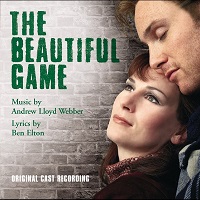 Original London Cast, 2000 (Telstar)
Original London Cast, 2000 (Telstar)  (3 / 5) Those who would type Andrew Lloyd Webber as a purveyor of lightweight poperettas may not know what to make of this tragic love story set against a background of social strife in Northern Ireland. Although the score lacks emotional variety, with too many sweet melodies, and Ben Elton’s frequently profane lyrics are hardly cliché-free, it’s a sincere attempt at something different and challenging from a composer who could certainly have rested on his laurels. Josie Walker and David Shannon sing attractively as Mary and John, the young couple whose lives are destroyed by the escalating violence between Catholics and Protestants. Walker partners beautifully with Dianne Pilkington as a Protestant girl in the unsettling “God’s Own Country” and makes something wrenching out of “If This Is What We’re Fighting For,” a bitter denunciation of the self-righteousness behind the violence. The title number has a harsh, celebratory vigor that one rarely associates with Lloyd Webber, who did the orchestrations with David Cullen. Although this score is far from a total success, the recording is well worth a listen — David Barbour
(3 / 5) Those who would type Andrew Lloyd Webber as a purveyor of lightweight poperettas may not know what to make of this tragic love story set against a background of social strife in Northern Ireland. Although the score lacks emotional variety, with too many sweet melodies, and Ben Elton’s frequently profane lyrics are hardly cliché-free, it’s a sincere attempt at something different and challenging from a composer who could certainly have rested on his laurels. Josie Walker and David Shannon sing attractively as Mary and John, the young couple whose lives are destroyed by the escalating violence between Catholics and Protestants. Walker partners beautifully with Dianne Pilkington as a Protestant girl in the unsettling “God’s Own Country” and makes something wrenching out of “If This Is What We’re Fighting For,” a bitter denunciation of the self-righteousness behind the violence. The title number has a harsh, celebratory vigor that one rarely associates with Lloyd Webber, who did the orchestrations with David Cullen. Although this score is far from a total success, the recording is well worth a listen — David Barbour
Ballad for Bimshire
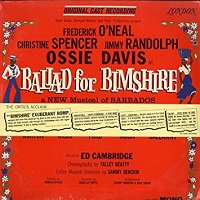 Original Off-Broadway Cast, 1963 (London/no CD)
Original Off-Broadway Cast, 1963 (London/no CD)  (1 / 5) This Off-Broadway oddity probably got produced because of the reputation of its composer, Irving Burgie — also known as Lord Burgess. Having written several songs that were popularized by Harry Belafonte, Burgie was one of the most prominent calypso writers of the period. But this show is more well meaning than well crafted; the writers and production team all had limited musical theater experience, and they produced a piece that, judging from the cast album, doesn’t seem to know what it wants to do or how to do it. Ballad for Bimshire clearly had a book — co-producer and co-star Ossie Davis, a driving force behind the production, narrates the story, but it’s not compelling and more than a little amorphous. The lyrics are negligible, which leaves only the tunes. They’re frequently appealing but, because they’re on their own, dramatically unrewarding. — David Wolf
(1 / 5) This Off-Broadway oddity probably got produced because of the reputation of its composer, Irving Burgie — also known as Lord Burgess. Having written several songs that were popularized by Harry Belafonte, Burgie was one of the most prominent calypso writers of the period. But this show is more well meaning than well crafted; the writers and production team all had limited musical theater experience, and they produced a piece that, judging from the cast album, doesn’t seem to know what it wants to do or how to do it. Ballad for Bimshire clearly had a book — co-producer and co-star Ossie Davis, a driving force behind the production, narrates the story, but it’s not compelling and more than a little amorphous. The lyrics are negligible, which leaves only the tunes. They’re frequently appealing but, because they’re on their own, dramatically unrewarding. — David Wolf
Bubbling Brown Sugar
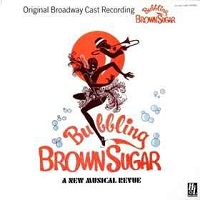 Original Broadway Cast, 1976 (Amherst) No stars, not recommended. This is arguably the least necessary Broadway album ever. Yes, the show was a hit (766 performances), and it served as the template for many black music revues to come, but this musical tour of Harlem in its renaissance days is the rough equivalent of one of those compilation albums that used to be hawked on cable TV. Jazz fans, who already know many recordings and arrangements of these songs, won’t be interested in over-theatricalized renditions of such standards as “Sophisticated Lady,” “Sweet Georgia Brown,” and “God Bless the Child,” while others will be puzzled by the occasional original number — one of which keeps reminding us that “Bubbling Brown Sugar is the stimulating Harlem treat.” This is one A train you don’t have to take — David Barbour
Original Broadway Cast, 1976 (Amherst) No stars, not recommended. This is arguably the least necessary Broadway album ever. Yes, the show was a hit (766 performances), and it served as the template for many black music revues to come, but this musical tour of Harlem in its renaissance days is the rough equivalent of one of those compilation albums that used to be hawked on cable TV. Jazz fans, who already know many recordings and arrangements of these songs, won’t be interested in over-theatricalized renditions of such standards as “Sophisticated Lady,” “Sweet Georgia Brown,” and “God Bless the Child,” while others will be puzzled by the occasional original number — one of which keeps reminding us that “Bubbling Brown Sugar is the stimulating Harlem treat.” This is one A train you don’t have to take — David Barbour

